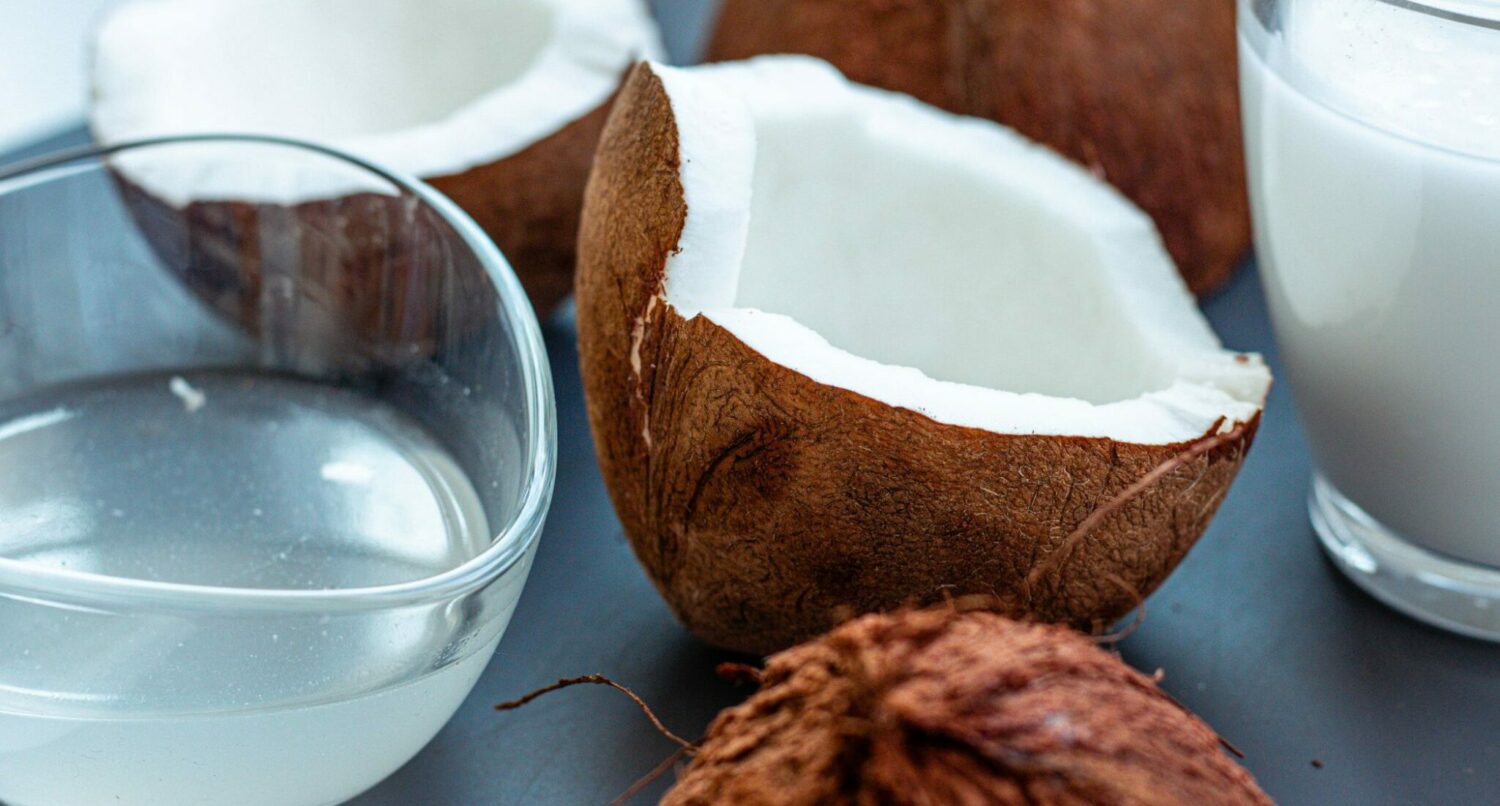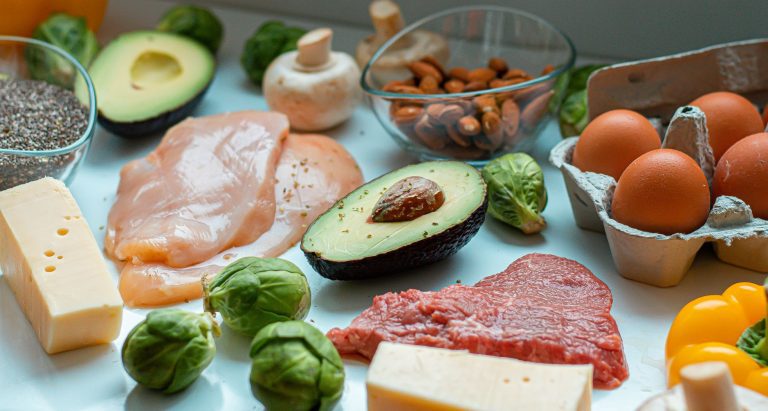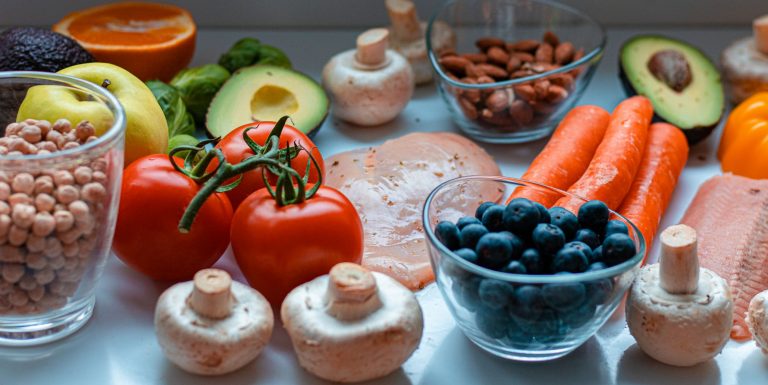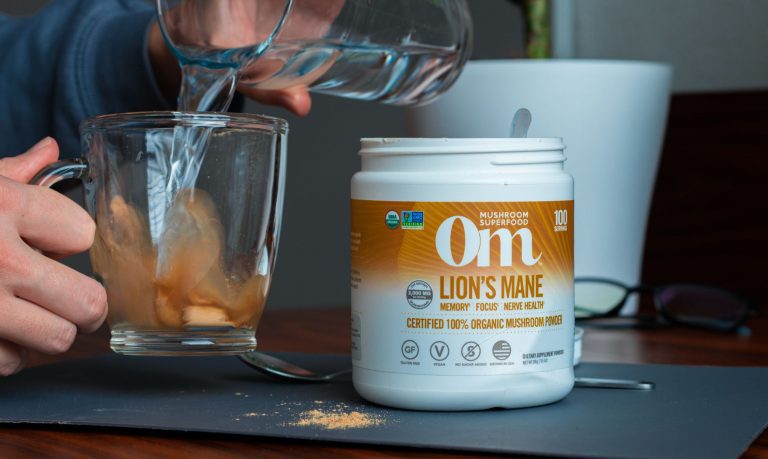Coconut Oil Benefits | Cognition, Brain-Power & Fat-Loss
What is Coconut oil?
Coconut oil is a popular superfood with numerous uses ranging from beauty and cosmetics to cognition and weight loss supplements. Coconut oil benefits extend beyond a simple skin moisturizer. It can be a great tool to add to a keto or LCHF stack for a faster shift into ketosis. It is a byproduct of pressing fresh coconut meat. It is an oil that comes from coconuts.
What is a Coconut?
The coconut we all know as nut, fruit or seed is technically a drupe, in Botanics. This means it is a fruit in which the endocarp with the seed inside is covered by an exocarp and mesocarp, the outer layers.
Coconut’s name derives from Spain & Portugal, dating back to the 16th century from the word “coco” meaning head or skull. Coconut grows on a palm tree known as Cocos nucifera.
Multiple uses of Coconut Nucifera
Multiple ways to use coconut is one of the primal reasons behind its popularity. I mean coconut palm can be used in house decoration, for its pinnate leaves & hard shells.
It can be used as a skin moisturizer, dead-cell extractor, hair conditioner, mouth oil-pulling & plaque-reducing food, and even as a wound healer or UV sun protector.
There is no doubt it is one of the most popular ketogenic foods used in many different recipes ranging from smoothies, to coffee, and sweets.
Besides eating coconut meat (kernel) for its health benefits, this superfood is also used for its milk, water, and oil.
Coconut liquids like Coconut water are being used in sports for hydration and electrolyte replenishment, while Coconut oils are used for Fat-loss & Brain Power, due to their MCT superpowers. All in all, this Cocos thing has an insane number of beneficial effects and practical ways of usage.
How is Coconut Oil Made?
Not every coconut oil is the same. Before we consume it or topically apply it, we must know how to choose the right form that suits our needs.
Coconut oil can be made from fresh or dry coconut meat, often done by cold pressing. This oil is Virgin Coconut oil and it has higher nutritional value, usually being mechanically produced with no additives or chemicals added. It is unrefined and it has a strong coconut flavor. Virgin coconut milk can be also made by wet-milling, which means it is extracted from coconut milk.
On the other side, there is refined coconut oil which can be bleached or deodorant. This one is made from copra, solvent expelled and it doesn’t have a strong coconut flavor. Higher nutritional value is present in virgin coconut oil, but refined is good as well, as an alternative option.
There is a difference between coconut products for skin or hair and the ones suitable for eating or supplementing that is why you must check the label or consult an expert to find the best option for you.
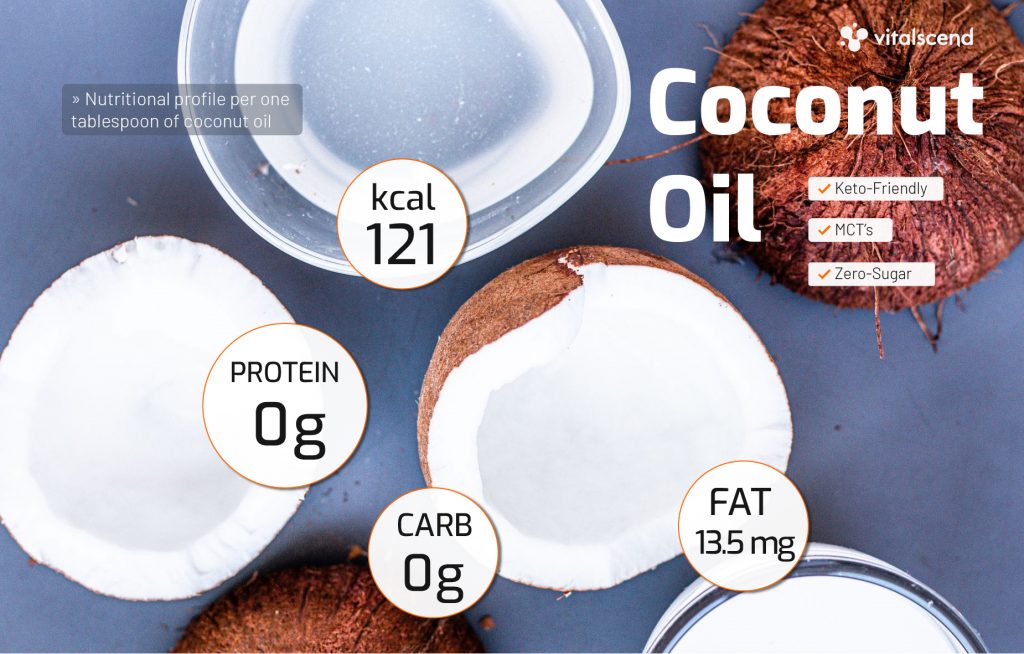
Is Coconut Oil a Superfood?
Yes, coconut oil has been jumping in and out of this list because of its “saturated fat content” and it has been debated whether it is a deadly poison or a healthy high-fat alternative.
Before we jump into the paradox of “Is Coconut oil healthy for your Heart”, we will first see the nutritional profile this Ketone & Mineral Powerhouse holds.
According to the U.S Department of Agriculture, 1 tablespoon of coconut oil has this nutritional profile:
| Calories: 121 kcal | 121 kcal |
| Saturated fat | 11.2 grams |
| Total fat | 13.5 grams |
| Protein | 0 grams |
| Carbohydrate | 0 grams |
We can see it is high in calories and saturated fat, expected for an oil. (1)
In fact, since it is high calorie and we cannot eat 100 grams of coconut oil, we can find better coco-alternatives out there like Coconut water to increase our intake of certain minerals like Magnesium, Iron, Zinc, Copper, Calcium, Manganese, and Phosphorus.
So for now, let’s stick to the Ketones for their power to reset insulin sensitivity, nourish your brain, and maybe prevent neurodegeneration & cognitive decline.
The Four Forms of Coconut Products
We must first separate and understand the differences in the 4 main coconut parts, whether we supplement with it or use it for its cosmetic properties. Here are the basic 4 forms/parts of coconut usage:
| Coconut meat | the white fleshy part |
| Coconut oil | the oil extracted from the meat |
| Coconut milk | white liquid/milk extracted from coconut meat |
| Coconut water | clear liquid/water inside the coconut |
The skincare, hair and nail supporters, or aftershave balm & shampoos are usually made using coconut oil and milk and should not be eaten. Raw coconut oil and milk, which are edible can be also put on the skin or hair for their cosmetic properties.
Why is coconut oil considered unhealthy?
Coconut oil has a very high content of saturated fat, hence why it was considered unhealthy or dangerous. Now research shows that it can raise both the bad and the good cholesterol, or LDL and HDL. Coconut oil can actually be anti-inflammatory, induce satiety and stabilize glucose levels.
It goes without saying that excessive consumption of coconut oil, as with many oils, is not good. However, coconut oil can actually be used for weight loss, as it has MCT’s or medium chain triglycerides which help us get into the fat-burning mode or ketosis faster. This is only applicable if we are glucose fasting or following a ketogenic diet.
Is Coconut Oil Dangerous?
Coconut has been considered a superfood, in fact, it has been the biggest buzz in the past couple of years as one of the top 10 superfoods on the market, but, because of some suggestions to keep our saturated-fat intake lower, it earned a bad reputation.
- Numerous paradoxes around the danger of saturated fats present in coconuts that may trigger cardiovascular diseases have arisen. There are lots of studies on Coconut oil’s effects on cholesterol, so I recommend reading it for yourself. We have to stay awake to the fact that coconut is a highly nutrient-dense fruit that has many potential effects on the body too.
- Even though there are correlations in coconut oil consumption and raised LDL levels, which is true, Coconut oil raises HDL (the good cholesterol) levels too. (2) (3) (4)
- LDL is not the only factor that contributes to cardiovascular problems, but the fat percentage, oxidative damage, and inflammation can trigger some cardiovascular diseases too, for which coconut has been great in both, reducing inflammation and weight loss. (5) (6)
- High-fiber coconut meat can improve feelings of fullness, digestion, and prevent overeating. (7) In normal adults, it was found that coconut reduced blood glucose and body weight values. (8)
- There are also numerous studies on Coconut oil effects in fat loss, thus coconut being one of the Keto-diet go-to’s to accelerate weight loss and fat loss.
Coconut oil is rich in MCT fats, which are medium-chain triglycerides that have been shown to improve fat processing and are easily digestible. MCT oil can increase leptin and peptide YY, both of which promote a feeling of fullness. (9) MCT rich diet has also been linked to greater loss of adipose tissue (in comparison to LCT, long-chain triglycerides) and increased energy expenditure in overweight men. (10)
- MCTs can be used by our bodies faster and more efficiently, thus providing us with energy based on ketones which can accelerate fat-loss and weight-loss. (11) This being the trick behind the Keto diet, it is important to note that our bodies might get used to it, so a long term high-fat diet may not be the best option. With this being said, the Keto diet and MCT might accelerate fat-loss and improve insulin sensitivity short-term. (12)
- It turns out that coconut oil is not bad nor dangerous at all unless you are allergic to it. This of course doesn’t mean to over-consume it. The main health rule is, moderation is the key, and that applies to coconut oil too. All I want to point out is one tablespoon of highly nutritious Coconut oil can provide you with some good benefits and is not dangerous. Most of its fats are MCT, which have multiple benefits for your body, brain, and heart health at the same time accelerating fat-loss.
- The dilemma of Fats and their effects on cardiovascular biomarkers or cholesterol is a lot more complex than we think. It is not just saturated and unsaturated fats, but there are lots of things in between. There are also studies that show no link between cardiovascular diseases and saturated fats. (13) (14)
Takeaway
In general, consuming a moderate amount of healthy fats like avocado, coconut oil, salmon, dark chocolate, eggs, nuts and olive oil, rich in omega 3’s, fiber, potassium, and other nutrients can be beneficial for your brain and heart.
Coconut oil Benefits
Coconut oil, the fatty oil rich in MCT or medium-chain triglycerides has grown in popularity recently as the Keto diet was on the rise. Besides the Ketone factor, coconut oil has many Uses for Skin & hair, which I cover in the last section of this article, so keep on reading!
Acts as Fat-Loss Accelerator
Coconut oil vs MCT oil
It is important to note that coconut oil and MCT oil are not the same supplements. Coconut oil has more than half of the saturated fat as MCT. MCTs are medium-chain triglycerides that are found helpful in accelerating fat loss, especially in the belly area. (15) When you digest MCT, there’s a higher thermogenic effect making you burn more fat.
MCTs are processed by the liver and are beneficial for fat loss due to our body’s ability to produce energy immediately from it if there is no glucose. Your liver can convert MCTs into ketones, which are the fuel source that’s produced when you burn fat for energy.
Difference between LCT and MCT
When it comes to weight loss, differentiate between LCT and MCT. Long-chain triglycerides are detrimental to heart health and increase cholesterol, LDL included. MCT on the other side is having different pathways and mechanisms of action than LTC, providing more benefits related to fat loss. MCTs are medium-chain triglycerides that are oxidized in the liver. (16) They are the second source of fuel when there is no glucose, and are more efficient for energy production than glucose.
MCT effects on weight loss, fat loss & energy expenditure
In comparison to olive oil, MCT oil (not coconut) has been shown to improve energy expenditure. MCT oil also had an effect on fat-burning, more than olive oil. 49 overweight participants aged 19-50 years took 18-24 g/d of MCT oil or olive oil for sixteen weeks. Out of thirty-one who completed the whole trial, the MCT oil group reduced their weight and experienced loss of fat mass, both total and intra-abdominal. (17)
- Virgin coconut oil was given to 20 healthy but obese male participants for four weeks. Coconut oil has been shown to exert some positive effects on lowering weight circumference while having no influence on lipid profile, suggesting it may be good to shred off the belly or visceral fat. (18)
- In this study, MCT outperformed LCT in overweight women. Results were increased energy expenditure and fat oxidation in the MCT group, without significant changes in body composition. (19)
- This study suggests the use of 15-30 grams of MCT oil to alter one’s energy expenditure levels since MCT improved EE by around 500kJ (varying between 268 kJ to 756 kJ). This low-to-moderate MCT intake might be beneficial if added as a daily habit/routine. (20)
Another important factor of Coconut oil of MCT that is related to weight loss is satiety. It has been proven that ketogenic diets are beneficial for improving the feeling of fullness, thus reducing your food cravings and preventing overeating. (21)
- MCT was also able to prolong exercise performance in high-intensity training, in recreational athletes. Prolonged exercise or stamina is correlated to burning more calories since you train for a longer duration. (22)
- MCTs have also been found to increase mitochondrial mass, a process known as mitochondrial biogenesis, as well as improve metabolism. This shows improved stamina and endurance, which again promotes fat loss due to longer-lasting training. (23)
How to use Coconut or MCT oil for fat-loss
Around 45-50% of coconut oils are lauric acid and only 8% or less are capric, caprylic, and caproic acids. Lauric acid acts similarly to LCT (long-chain triglycerides) in metabolism and absorption. (24)
Studies that confirmed that MCT oil had beneficial effects on weight loss used MCT oil that was high in capric and caprylic acid while being low on lauric acid. Coconut oil’s composition is not the same, but this was special MCT oil, which means that Coconut oil by itself is not going to produce the exact same benefit. (25)
This doesn’t mean that coconut oil is not beneficial for weight loss, it just means that consuming MCT oil that’s higher in capric and caprylic acid is a better alternative if your main goal is to shred some fat.
Besides the regular ketosis-inducing state which puts us in sugar-starvation mode, and consuming fats in a fasted state to produce ketones more efficiently, there are three other tactics that may help you boost the weight loss effect, with using coconut oil.
- Adding it ½ hour before a meal can suppress your appetite, thus preventing overeating.
- Switch vegetable, canola, and soy-based oil with coconut oil and cook on low heat with it.
- Use it in moderation, since it is a high-calorie option.
summary
Coconut oil can be beneficial in weight loss, but MCTs are a way better option for someone who is on a calorie-restrictive diet. MCT oil which is higher in capric and caprylic acid and lower in lauric is the best fat-burner alternative, related to coconut.
Reasons why Coconut oil, MCT, or exogenous ketones can help you with fat loss:
- Increases energy expenditure
- Improves mitochondrial function
- Reduces visceral fat
- Aids in Weight loss mechanism
- Raises your metabolic rate
- Suppresses hunger, increases satiety

May Enhance Brain Function
Healthy fats have been widely known as a good brain and heart supporter. Hormones are formed from fat and cholesterol, so eating healthy fats can aid in hormone production. Aside from this, fats are crucial for fat-soluble vitamins like vitamin A, E, K, and D absorption, which have multiple functions in the body.
Matter of fact, MCT is the main ingredient of Bulletproof coffee, known to assist fat loss and elevate cognition. Its nootropic effect is not just due to its nutrient-dense profile that nourishes the brain. Coconut, as you already know is rich in MCT, which can be easily converted to ketones for energy.
Glucose vs Ketones for the Brain
Our brain uses glucose as its primal fuel, but when glucose is not available we have a backup plan. Your brain is the most important organ for survival and your body will do everything (including taking blood and nutrients from other organs) to keep itself alive.
When we are in a sugar-starvation mode, we do not have enough glucose and that’s where the body starts breaking down fat molecules to produce ketones which are made by the liver. Ketones are known as keto bodies too, they are a by-product of fat metabolism in the liver when our bodies are using ketones or fats for energy.
Why use Ketones as brain fuel?
Well, besides many Keto-diet fans who follow high-fat/low-carbohydrate diets saying they experienced a higher sense of calmness, alertness, and productivity following the Keto plan, there is actual research that can confirm this evidence.
The cognitive decline that comes with the aging brain has been related to the reduced ability of the brain to utilize glucose, especially in the hippocampus and prefrontal cortex. Rats fed with the ketogenic diet in this study have shown improved cognitive performance. MCT1 and MCT4, ketone body transporters were found to be higher in ketogenic-fed rats, while GLUT1, the glucose transporter across the blood-brain barrier was reduced. (26)
Fifty-two subjects with mild cognitive impairment were randomized to 30 g/day of MCT or placebo. They found out that brain ketone metabolism was increased by 230% for the MCT-fed subjects. This group also improved executive function, memory, language, and processing speed scores. (27)
Ketones have been shown to raise glutathione peroxidase four-fold in the hippocampus of rats. This enzyme plays a major role in antioxidant & anti-inflammatory processes. (28)
The ketogenic diet has been shown to improve the brain’s ability to balance excitatory and inhibitory neurotransmitters like glutamate and GABA. This may balance mood, and bring a brain-power state known as relaxed alertness, effects that is similar to L-theanine consumption. (29) (30)
Neuroprotection | MCT effects on Alzheimer’s disease
Alzheimer’s disease and age-related cognitive decline are associated with reduced brain ability to use glucose, its primal fuel. Ketone bodies can play a major role here since they are a backup alternative to fueling your brain with energy.
Another study on Coconut MCT oil in the prevention of Alzheimer’s disease, suggests that phenolic compounds and hormones found in coconut may assist in preventing amyloid plaque build-up in the brain. (31)
Coconut is the ultimate high-fat, low-carb food, suitable for a Ketogenic diet. The reason why this diet may work for brain health is that it supports mitochondrial function while decreasing oxidative stress.
B-Hydroxybutyrate is one of the most important ketones, which was shown to reduce the production of ROS (reactive oxygen species) and stimulate antioxidant system function. (32)
MCT or ketone supplementation is linked with improvement in mental function and performance in patients with Alzheimer’s. The main mechanism behind it is thought to be preventing hyperexcitability and neuroinflammation. (33) (34)
- In this study, 23 older participants with mild cognitive impairment were fed a high-fat ketogenic diet. After six weeks there was an improvement in the verbal memory performance. (35)
- 5 out of 7 people with Parkinson’s were eating a high-fat, ketogenic diet for 28 days. An improvement in Parkinson’s disease rating scale was shown, and cholesterol increases were prevented in 4 volunteers. (36)
Antioxidant effects on the brain
Virgin coconut oil is highly nutritious. It has certain phytochemicals that may aid in fighting brain inflammation and reducing damage caused by oxidative stress. (37)
Coconut is extremely rich in many phenolic, antioxidant-like compounds (salicylic, caffeine, p-coumaric, and gallic acid) that can lower inflammation and decrease oxidative stress damage. (38) (39)
Mice treated with Virgin coconut oil performed better in a swimming test. Coconut oil increased their levels of brain antioxidants, while decreasing triglycerides, glucose, and corticosterone. This study suggests potential antioxidant and anti-stress functional properties of coconut oil (40)
summary
Coconut oil, MCT oil, and exogenous ketones can help your brain function better. Ketones are the secondary brain fuel that can enable the brain to get into a state of calm alertness, thus improving productivity. Ketones have also been shown to prevent cognitive decline and may prevent Alzheimer’s disease. Phenolic antioxidant-like compounds in MCT can reduce inflammation and oxidative damage in the brain.
Frequently Asked Questions
What are the benefits of coconut oil?
Coconut oil can be used to accelerate fat-loss and weight-loss, although it is rich in saturated fats. During a ketogenic eating regime or fasting, as glucose drops, we can shift to using fats for fuel, to produce energy. This is where coconuts MCT comes in handy, to facilitate the transition to ketones. Another great side effect that comes from this is potentially improve alertness, cognitive function and focus. Coconut oil has also a myriad of benefits for the skin, scalp, nails, hence why it is a popular beauty tonic.
Is coconut oil good for the skin?
Coconut oil is a very effective natural moisturizer for the skin. People apply it topically, in combination with other creams and solutions for it antiviral, antimicrobial and anti-inflammatory properties too.
Can coconut oil and MCT help with weight loss?
Coconut’s MCT’s or medium chain triglycerides are very effective at stimulating ketosis and facilitating the shift from using glucose to burning fat for energy. However, for this effect to occur we need to be in a faster state (glucose-wise) or follow the ketogenic diet. The idea is shifting towards fats (burning them), using them to produce energy, instead of glucose.
Can I use coconut oil for cooking?
Yes, but try to avoid deep frying or any sort of high-temperature cooking styles, like frying. You can add it to salads and shakes, use it for sauteing and searing. Also, make sure you use it in moderation, as with many fats, this one is rich in saturated fats so over-consumption is not good.

